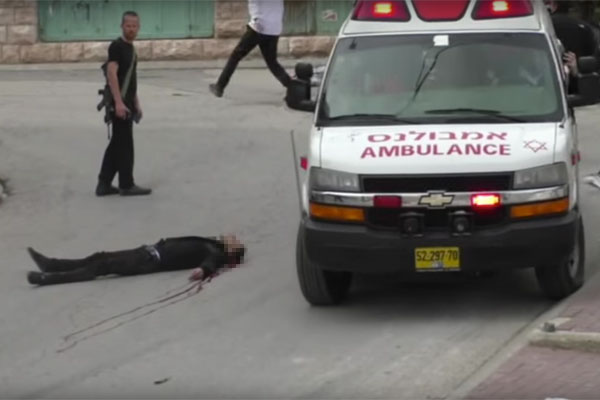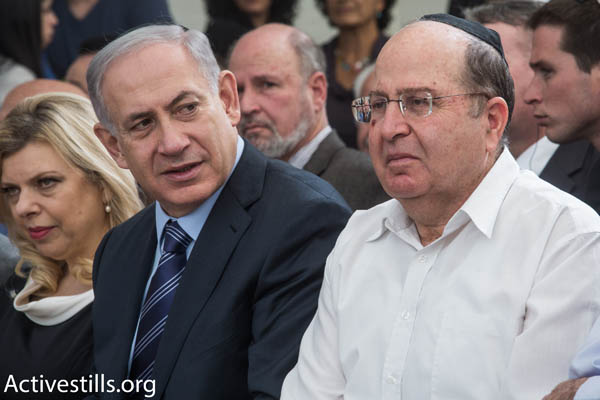Only one-fifth of Israelis say the prime minister, defense minister, and the IDF chief of staff did the right thing when they condemned the killing. Fully 68 percent believe otherwise.

Based on the condemnations from top levels of the political and defense establishment, it appears that Israelis were actually disturbed by the video of an IDF soldier killing a wounded Palestinian who lay motionless on the ground. The issue still topped the news media on Sunday, with new details emerging: Haaretz reported on early investigations indicating the soldier acted of his own accord, then updated that the soldier had said “the terrorist has to die” before shooting the motionless man, who had been on the ground for approximately six minutes, according to other news reports.
But as +972’s Natasha Roth wrote, the killing of 21-year-old Abed Fatah al-Sharif happened in a climate that largely supports — rather than discourages — this sort of action. Israeli Defense Minister Moshe Ya’alon condemned the attack, but not long ago he and other officials called for the killing of all terrorists rather than have them arrested. The same goes for political leaders from the right and the center, as well as religious authorities. To the public, it appears that killing an incapacitated terrorist six minutes later isn’t so different from killing one in action.
The public is apparently confused and perhaps frustrated with the mixed messages. A female family member of the soldier (they have not been formally identified by the press) who sounded young enough to be his sister spoke to the news. Sobbing and shattered, she pleaded with the country to view the soldier as a hero. Her voice shook with agony; she seemed incapable of understanding how he could be a model child one minute and an enemy of the people the next.
The public is apparently on her side. A poll conducted for Channel 2 showed 57 percent of Israelis opposed his very arrest – not a conviction, not even an indictment. Actually the question asked about the “arrest and investigation” – so we can infer that the majority did not even want the investigation at all.
A plurality of respondents, 42 percent, described his action as “responsible,” while another 24 percent said it was the natural response to the situation. The first response can be qualified because the wording actually stated that shooting was a “responsible action to ensure the man wouldn’t detonate a suicide bombing” – which in a sense redefines the notion of leading question.
But whether al-Sharif had such a bomb was hard to discern at the moment. There haven’t been any definitive suicide bombings in this wave of violence. In fact there haven’t been any since 2008. When one person suspected the wounded attacker of having a suicide belt, his instruction (caught on the audio of another tape) was not to touch him and wait for bomb squads. None of the personnel standing around felt the need to shoot the al-Sharif again – perhaps because, according to one report, he had already been checked by an officer to ensure he wasn’t wearing a bomb.
In the same question from the survey, fewer than one-fifth (19 percent) said the soldier overstepped his orders, while only five percent called it murder. Without pre-judging the outcome of an investigation myself, it is still significant that 66 percent in total gave a laudable description, and just a tiny minority saw the point-blank shooting of a motionless person as murder.
The social media scene is typically even more extreme than the representative sample. Channel 2 gets credit for a valuable survey of social media conversations. Buzzilla, the research company, found an overwhelming 82 percent of conversation across a range of social media platforms, including Facebook, Twitter, and a range of blogs – that were favorable towards the soldier. Over 13,000 people have joined Facebook support groups for him, and 50,000 have signed a petition in his favor.

But perhaps the most striking finding for me was the final question in the Channel 2 regular (representative sample) poll. Only one-fifth of respondents said the prime minister, defense minister, and the IDF chief of staff did the right thing when they condemned the killing. Fully 68 percent said it was not.
There is something ominous in this finding. Netanyahu is the hero of the Right, and has been rewarded at the ballot box for his nationalist triumphalism and incitement against Arabs. Defense Minister Ya’alon is similarly lauded by the Right. The moment Chief of Staff Eizenkot expressed doubts about killing a 13-year old girl holding scissors back in February, he was unceremoniously thrashed. On Sunday someone hung notices near the defense ministry in Tel Aviv portraying him as Haman.
One wonders if the waves of violent sentiments the leadership has blissfully stirred for years to such great political lucre, are bursting their banks — perhaps no longer controllable by the sorcerers who conjured them.


